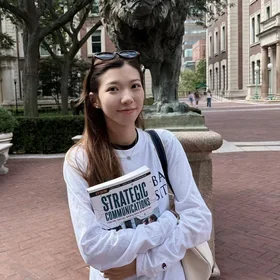What can be gained from enrolling in a master’s program mid-career? Armando Martins, M.S. in Human Capital Management (HCM) candidate, believes that post-graduate studies not only enhance one's career but are integral to success.
Martins has worked for leading multinational firms like General Electric, Uber, and Meta, in countries all around the globe, including the U.S., Mexico, Singapore, Argentina, Ireland, and the U.K. Even though he has flourishing career, Martins decided he wanted to earn a master’s degree in human capital management. “I firmly believe that the business realm must consistently glean insights from academia,” says Martins. “That conviction prompted me to pursue my master's at Columbia.”
In a recent interview, we talked to Martins about his experience in the program, artificial intelligence as it relates to human resources (HR), and his favorite course at SPS.
Tell us a bit about your background.
I have 15 years of experience in human resources, business partnership, learning and development, talent management, and people analytics. Currently, my primary focus is in-depth academic research exploring the impact of AI on human capital functions and the implications of layoffs. I came to Columbia because I wanted to enhance my skills in leveraging credible sources, citations, and studies while developing my HR projects.
What has your experience in the program been like?
Being in this program has been a remarkable learning experience. The knowledge guiding the human capital world often originates in academia and influences the information consumed by corporations from major consultancy firms. In this program, I’m gaining insights into constructing a research project and understanding the crucial role that sophisticated studies play in the HR field. I’m honing my skills in structuring impactful studies and incorporating data to test hypotheses and assumptions.
Your research interests include AI in the workplace. Do your courses examine topics related to emerging technologies?
Being in the HCM master’s program at this time is fascinating. We delve into the applications of AI in human capital management, explore the potential of virtual reality for training and development within the workplace, and analyze the dynamics of hybrid work models, considering their impact on organizational structures and employee well-being. The focus is on bridging theoretical concepts with practical implementation strategies.
I’m realizing that human judgment in evaluating and contextualizing data plays a crucial role in HR work, because that’s an area where machines currently fall short. As students in the HCM master’s program, we want to further our skills in order to contribute value by translating HR data analytics into solutions for business challenges. This is a vital skill for the future of any business.
Describe your favorite course at SPS.
One lecture I really appreciate is Professor Steve Safier’s Integrated Talent Management Strategies course. This course delves into some of the most intricate aspects of the human capital domain: integrating diverse strategies, connecting the dots, and making a meaningful impact on organizations. Throughout the course, we've had chances to test our proposals with special guests sharing valuable insights on creating synergies between various HR programs.
During a session in the course, KimLoan Tran, a senior HR executive at AllState, shared insights into implementing agile management strategies. Learning from her experiences, we gained practical perspectives on fostering adaptability within organizations and enhancing our understanding of effective management strategies in real-world scenarios.
About the Program
The Columbia University M.S. in Human Capital Management program prepares graduates to be world-class HCM strategists able to address changing needs in building and motivating talented, engaged workforces in the private, public, academic, and not-for-profit sectors. The program is available part-time, full-time, on campus, and online.
About the Integrated Talent Management Course
In this course, students will examine how connected organizational processes are designed to attract, manage, develop, motivate and retain key people. Through in-depth investigations of key talent processes—such as performance management, career management, succession management, leadership development, learning and capability development, total rewards, and talent acquisition—students will apply these insights in an industry-based exercise designed to demonstrate how an organization’s overall capabilities are more effective when integrated through a common interface, data platform, workflow, and cross-process reporting and analytics.


